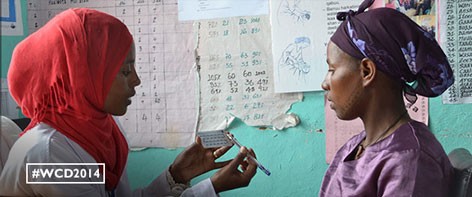- What We Do
- Agriculture and Food Security
- Democracy, Human Rights and Governance
- Economic Growth and Trade
- Education
- Ending Extreme Poverty
- Environment and Global Climate Change
- Gender Equality and Women's Empowerment
- Global Health
- Water and Sanitation
- Working in Crises and Conflict
- U.S. Global Development Lab

September 2014

More than 222 million women in developing countries want to delay or avoid pregnancy but are not using a modern method of family planning.
By enabling women to time and space their pregnancies at healthy intervals, family planning could reduce maternal deaths by 30 percent and child deaths by 28 percent globally. Furthermore, family planning is recognized as a highly cost-effective development intervention to promote healthy families, increase opportunities for economic development, and enable strong and vibrant nations.
World Contraception Day 2014 draws attention to the importance of expanding access to modern methods of contraception through voluntary family planning programs.

Five Game Changing Innovations in Contraception
The U.S. Agency for Intenational Development (USAID) has supported the development of essentially every modern contraceptive available today, both in the U.S. and abroad. Read this blog post on five promising new innovations in contraception by Ellen Starbird, USAID’s Director of the Office of Population and Reproductive Health.
- Read the Impact blog post.

Photo Album: Expanding Access to Modern Contraception
In honor of World Contraception Day 2014, USAID held a call for photos taken around the world that tell the story of family planning’s positive impact on women, their families, and their communities.
- View the photos on Facebook and share your favorite!

Senator Bill Frist on Why Family Planning Matters
Senator Bill Frist explains why he thinks expanding access to voluntary family planning is crucial to improve the lives of women, children, and families across the globe.
- Watch the video of Senator Bill Frist discussing family planning.
New Country Briefs Highlight Impact of Family Planning
USAID through the USAID | DELIVER PROJECT, has published 20 country briefs outlining how access to modern methods of contraception has saved lives and improved health outcomes among women. Don’t miss the updated “Contraceptives Save and Improve Lives” infographic showcasing the impact of USAID’s global family planning programs.
- Read the country briefs.
- View the “Contraceptives Save and Improve Lives” [PDF, 2.47MB] infographic.

The Last Mile Photo Blog
For any health program to be successful, products must be available at health facilities. The USAID | DELIVER PROJECT’s photo blog shows how the project works to deliver contraceptive supplies through “the last mile” and into the hands of clients.
- Explore the USAID | DELIVER PROJECT’s photo blog.
Photo sources for top banner left to right:James Pursey/EGPAF, Marcy Erskine/IFRC, Jameel Ahmad/JSI/PAIMAN.
Newsletter Archive
Breastfeeding and Nutrition
August 2017
Global Health Financing
July 2017
Maternal and Child Survival
June 2017
Human-centered Design. What is it?
May 2017
Focus on Infectious Diseases: 2017
April 2017
Global Health Highlights: 2016
December 2016
A Year in Review: 2015
January 2016
World AIDS Day 2015 – Special Edition
December 2015
USAID's News Storytelling Hub - Extreme Possibilities
August 2015
A New Roadmap to Health and a TB Diagnostic Test Help Improve Health Outcomes
June 2015
World AIDS Day 2014 – Special Edition
December 2014
Fighting Ebola – Special Edition
October 2014
Maternal and Child Survival – Special Edition
October 2014
World Contraception Day 2014 – Special Edition
September 2014
AIDS 2014 E-News – Special Edition
July 2014
World TB Day 2014 Special Edition
March 2014
AIDS 2014 E-News – Special Edition
December 2013
World AIDS Day 2013 – Special Edition
December 2013
Family Planning Updates
November 2013
Tuberculosis Special Edition
November 2012
STAY CONNECTED
Subscribe to the Global Health E-Newsletter and updates by entering your e-mail address below. Take a look at some of our past issues.
Follow USAID Global Health on Social Media:







Comment
Make a general inquiry or suggest an improvement.